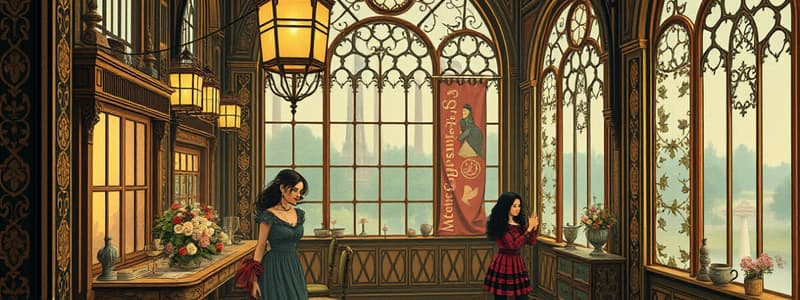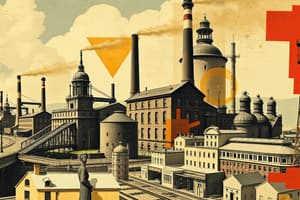Podcast
Questions and Answers
What philosophical movement emerged during the Renaissance, focusing on human potential and achievements?
What philosophical movement emerged during the Renaissance, focusing on human potential and achievements?
- Romanticism
- Existentialism
- Rationalism
- Humanism (correct)
Which of the following inventions was a significant innovation of the Industrial Revolution?
Which of the following inventions was a significant innovation of the Industrial Revolution?
- Telegraph
- Printing press
- Electric bulb
- Steam engine (correct)
Which factor primarily motivated the expansion of European powers during the period of imperialism?
Which factor primarily motivated the expansion of European powers during the period of imperialism?
- Cultural exchange
- Religious conversion
- Economic interests (correct)
- Technological advancement
What event primarily marked the end of the Cold War Era?
What event primarily marked the end of the Cold War Era?
Which of the following was NOT a consequence of World War II?
Which of the following was NOT a consequence of World War II?
What is a primary characteristic of globalization in the late 20th and 21st centuries?
What is a primary characteristic of globalization in the late 20th and 21st centuries?
Which social movement advocates for equality and rights based on gender?
Which social movement advocates for equality and rights based on gender?
What ideology emphasizes national identity and self-determination?
What ideology emphasizes national identity and self-determination?
Flashcards are hidden until you start studying
Study Notes
Overview of Modern History
- Time Period: Generally considered from the late 15th century to the present.
- Key Themes: Industrialization, imperialism, globalization, political revolutions, social changes, and technological advancements.
Major Eras in Modern History
-
Renaissance (14th-17th Centuries)
- Cultural revival in art, science, and literature.
- Humanism emerged as a key philosophy.
- Notable figures: Leonardo da Vinci, Michelangelo, Galileo.
-
Age of Enlightenment (17th-18th Centuries)
- Emphasis on reason, individualism, and skepticism of traditional authority.
- Influential philosophers: John Locke, Voltaire, Rousseau.
- Laid groundwork for modern democracy and human rights.
-
Industrial Revolution (18th-19th Centuries)
- Transition from agrarian economies to industrialized ones.
- Innovations in manufacturing, transportation (steam engine, railroads).
- Urbanization and changes in labor dynamics.
-
Imperialism (19th Century)
- Expansion of European powers into Africa, Asia, and the Americas.
- Motivated by economic interests, nationalism, and cultural superiority.
- Consequences: exploitation of resources, cultural changes, conflicts.
-
World Wars (20th Century)
- World War I (1914-1918): Triggered by nationalism, militarism, and alliances.
- World War II (1939-1945): Result of unresolved issues from WWI and the rise of totalitarian regimes.
- Major outcomes: establishment of the United Nations, decolonization, and the Cold War.
-
Cold War Era (1947-1991)
- Political and ideological conflict between the USA (capitalism) and USSR (communism).
- Key events: Korean War, Cuban Missile Crisis, Vietnam War.
- End marked by the fall of the Berlin Wall in 1989 and dissolution of the USSR in 1991.
-
Globalization (Late 20th-21st Century)
- Increased interconnectedness through trade, technology, and culture.
- Rise of multinational corporations and global economic institutions (WTO, IMF).
- Impact on local cultures, economy, and environment.
Key Concepts
- Nationalism: Political ideology emphasizing national identity and self-determination.
- Social Movements: Various movements advocating for civil rights, feminism, environmentalism, etc.
- Technological Advancements: Innovations reshaping societies (internet, medical advancements, renewable energy).
- Post-Colonialism: Examination of the aftermath of colonization and its ongoing effects on formerly colonized nations.
Important Figures
- Mahatma Gandhi: Leader of Indian independence movement through non-violent resistance.
- Martin Luther King Jr.: Key figure in the American civil rights movement advocating for racial equality.
- Nelson Mandela: Anti-apartheid revolutionary and former President of South Africa.
Contemporary Issues
- Climate Change: Global warming and environmental degradation as pressing challenges.
- Inequality: Economic and social disparities within and between countries.
- Geopolitical Tensions: Ongoing conflicts, terrorism, and resurgent nationalism affecting global stability.
Overview of Modern History
- Time frame spans from the late 15th century to present.
- Key themes include industrialization, imperialism, globalization, political revolutions, social changes, and technological advancements.
Major Eras in Modern History
-
Renaissance (14th-17th Centuries)
- Characterized by a cultural revival in art, science, and literature.
- Emergence of humanism as a dominant philosophy.
- Influential figures include Leonardo da Vinci, Michelangelo, and Galileo.
-
Age of Enlightenment (17th-18th Centuries)
- Focus on reason, individualism, and skepticism toward established authority.
- Prominent philosophers such as John Locke, Voltaire, and Rousseau contributed to this era.
- Provided foundational ideas for democracy and human rights development.
-
Industrial Revolution (18th-19th Centuries)
- Marked a shift from agrarian to industrial economies.
- Innovations like the steam engine and railroads transformed transportation and manufacturing.
- Triggered urbanization and redefined labor dynamics.
-
Imperialism (19th Century)
- European powers expanded their influence into Africa, Asia, and the Americas.
- Driven by economic interests, nationalism, and a sense of cultural superiority.
- Led to significant resource exploitation, cultural shifts, and conflicts.
-
World Wars (20th Century)
- World War I (1914-1918): Stemmed from nationalism, militarism, and complex alliances.
- World War II (1939-1945): Resulted from unresolved issues post-WWI and the rise of totalitarian regimes.
- Major outcomes include the establishment of the United Nations, decolonization processes, and the onset of the Cold War.
-
Cold War Era (1947-1991)
- Ideological rivalry between the USA (promoting capitalism) and the USSR (advocating communism).
- Significant events include the Korean War, Cuban Missile Crisis, and Vietnam War.
- Culminated in the fall of the Berlin Wall in 1989 and the dissolution of the USSR in 1991.
-
Globalization (Late 20th-21st Century)
- Increased global interconnectedness evident in trade, technology, and cultural exchanges.
- Emergence of multinational corporations and global economic entities like the WTO and IMF.
- Impact includes changes to local cultures, economies, and environmental challenges.
Key Concepts
- Nationalism: Political ideology centered on national identity and the right to self-determination.
- Social Movements: Various movements, including civil rights, feminism, and environmentalism, seeking societal change.
- Technological Advancements: Innovations (e.g., internet, medical breakthroughs, renewable energy) dramatically altering societies.
- Post-Colonialism: Focus on the consequences and ongoing effects of colonization on formerly colonized nations.
Important Figures
- Mahatma Gandhi: Prominent leader of the Indian independence movement utilizing non-violent resistance strategies.
- Martin Luther King Jr.: Influential figure in the American civil rights movement advocating for racial equality and justice.
- Nelson Mandela: Leading anti-apartheid revolutionary and former President of South Africa, symbolizing resilience against oppression.
Contemporary Issues
- Climate Change: Significant global challenge due to climate change and environmental degradation.
- Inequality: Economic and social disparities persist both within nations and globally.
- Geopolitical Tensions: Ongoing conflicts, terrorism, and the resurgence of nationalism threaten international stability.
Studying That Suits You
Use AI to generate personalized quizzes and flashcards to suit your learning preferences.




